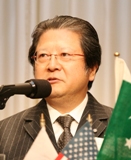��Rotary Foundation�� Meeting
��The Meaning of My Study in the U. K.��
November 5, 2008
Mr. Makoto Honjo,
Former Rotary Foundation Ambassadorial Scholar,
 ��My one year period of study in the UK 40 years ago was truly the greatest in my life.
��My one year period of study in the UK 40 years ago was truly the greatest in my life.
��At present, I am a Paul Harris Fellow and this is, at least in part and in some certain form, an expression of my sense of appreciation to the Rotary Club.
��At that time and the same today, the academic year in UK universities began in October. At the University of Kent, where I studied, the fall semester ran 10 weeks followed by a 1 month winter break, winter semester ran 10 weeks followed by a 1 month spring break, and then the academic year finished with another 10 weeks of studies in the final semester. .
��During the winter break, I took a trip to West Germany. At that time, there were still West Germany and East Germany. In contrast to the UK, which was in a continuous recession, I felt in West Germany an atmosphere peculiar to countries experiencing rapid economic growth.
��There were many foreign workers in West Germany. They came from the neighboring countries such as Turkey, Italy, and Yugoslavia, and came to West Germany purely for economic reasons. I thought then that even Japan, some time in the future, will also face issues with foreign workers.
��The year before last, at a worksite in a leading Japanese manufacturer in Hamamatsu, someone told me that a manufacturing line can not be operated without foreign workers. In today��s Japan, the increase in foreign workers is somewhat a natural course of events. I feel that Japan also needs to clearly decide that foreign workers ��should be accepted�� and examine ��what sort of treatment�� ought to be given these foreign workers.
��Getting back to the UK, in the second semester of my study there, as a result of making new friends I was able to appreciate that the UK at that time was making a concerted effort toward breaking down its stratified society. I also understood that ��the UK has a privileged class that is succeeded through the generations��, and that it is mistaken. The UK has constantly been tackling the problem of ��breaking down its stratified society��. When I was studying in the UK, there was school tuition relief provided depending upon families�� income levels. In some cases, the government even paid students�� living expenses. There was an environment in which the students can dedicate themselves to studies without having to work. This is the real picture of the UK, which had been ridiculed as the aging empire fading into the sunset.
��In all aspects, recent Japan has excessively been pursuing efficiency through homogenization. The entire society has become an axenic culture, and has developed a strong allergy to alien substances. It has become closed toward the outside and there is a concern that Japan has become fragile against change. In a world where the United States is facing a relative decline in her status and the world is heading again toward becoming multi-polar and even greater diversity is expected, can Japan survive in the future?
��The UK has accepted large numbers of foreign workers. Moreover, those workers have been accepted at all levels of society and they are actively stimulating UK society. Foreign workers issues and scholarship issues may seem unrelated but there is a common thread of actively seeking out and accepting diversity.
��For some 26 years after returning from the UK, I did not have an opportunity to visit the UK again. However, at last in August 1998 I was fortunate to visit the UK on business.
��Since I lived in the UK society in the 1970��s I knew the British people, and with having traveled Europe, I had a certain sense of feeling about the Germans, the Belgians and the Dutch people. Relying on my memories of that time, I was able to carry on conversations with many new people. Those helped me a great deal in my new assignment. I can safely say that my study abroad experience at the beginning of the 70��s led to my current business success in Europe.
��I have no peculiar tangible assets, but what I have in my heart are all intangible. None the less, my assets have been preserved clearly, and have come time to time to be a great source of support. I am forever thankful to the Rotary Foundation and to all of you who support it. You and the Rotary gave me the opportunity to obtain this precious asset.